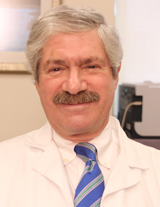PHILADELPHIA -- Two researchers from the Perelman School of Medicine at the University of Pennsylvania are among the recipients of the 2016 Clinical Research Achievement Award. The researchers recognized include Carl H. June, MD, the Richard W. Vague Professor in Immunotherapy in the department of Pathology and Laboratory Medicine, for his work on T cell therapies to treat multiple myeloma, and Alain H. Rook, MD, a professor of Dermatology and director of the Cutaneous Lymphoma Program at Penn Medicine, for his research on resiquimod therapy for cutaneous T-cell lymphoma.

Carl H. June, MD

Alain H. Rook, MD
The Clinical Research Forum recognized the year’s 10 most outstanding research papers written by teams from across the nation at its 5th annual awards ceremony in Washington, D.C., on April 12.
June is being acknowledged for his myeloma research progress, which included papers from 2015 on two different T cell therapies published in the New England Journal of Medicine and Nature Medicine.
In the Nature Medicine paper, June and his colleagues documented results from a clinical trial investigating a new T cell receptor (TCR) therapy that uses a person’s own immune system to recognize and destroy cancer cells. The team demonstrated a clinical response in 80 percent of multiple myeloma patients with advanced disease after undergoing autologous stem cell transplants. In this trial, researchers modified T cells to attack cancer cells expressing NY-ESO-1, an antigen found in nearly 60 percent of multiple myelomas and previously shown to be associated with tumor growth and poor prognosis.
June collaborated with Edward Stadtmauer, MD, chief of Hematologic Malignancies in Penn’s Abramson Cancer Center and a professor of Hematology/Oncology, Alfred Garfall, MD, an assistant professor in the division of Hematology/Oncology at Penn, as well as researchers from the University of Maryland School of Medicine, and Adaptimmune Therapeutics plc (Adaptimmune). Aaron P. Rapoport, MD, the Gary Jobson Professor in Medical Oncology at the University of Maryland School of Medicine, was the lead author. Dr. Rapoport, a longtime researcher collaborator with Dr. June, is also the director of the Blood and Marrow Transplant Program at the University of Maryland Greenebaum Cancer Center.
June’s second paper, published in the New England Journal of Medicine, with his collaborators Stadtmauer and Garfall, documented the successful treatment of a multiple myeloma patient whose cancer had stopped responding after nine different treatment regimens. The patient experienced a complete remission after receiving an investigational personalized cellular therapy developed by Penn researchers.
Rook planned and served as principal investigator on a study published in the journal Blood.
The study demonstrated that resiquimod gel, an investigational topical drug, which potently activates the immune response, causes regression of both treated and untreated tumor lesions and may completely remove cancerous cells from both sites in patients with early stage cutaneous T cell lymphoma (CTCL) – a rare type of non-Hodgkin lymphoma that affects the skin.
The results of Rook’s study are giving hope to patients who have not responded to other treatments, including certain types of topical chemotherapy, phototherapy and even systemic treatment with interferon alpha and oral bexarotene.
Formed in 1996, the Clinical Research Forum convenes annually to allow industry leaders to discuss issues facing the field, best practices, and promote understanding and support for clinical research and its impact on health and healthcare. More information is available at www.clinicalresearchforum.org.
Penn Medicine is one of the world’s leading academic medical centers, dedicated to the related missions of medical education, biomedical research, excellence in patient care, and community service. The organization consists of the University of Pennsylvania Health System and Penn’s Raymond and Ruth Perelman School of Medicine, founded in 1765 as the nation’s first medical school.
The Perelman School of Medicine is consistently among the nation's top recipients of funding from the National Institutes of Health, with $550 million awarded in the 2022 fiscal year. Home to a proud history of “firsts” in medicine, Penn Medicine teams have pioneered discoveries and innovations that have shaped modern medicine, including recent breakthroughs such as CAR T cell therapy for cancer and the mRNA technology used in COVID-19 vaccines.
The University of Pennsylvania Health System’s patient care facilities stretch from the Susquehanna River in Pennsylvania to the New Jersey shore. These include the Hospital of the University of Pennsylvania, Penn Presbyterian Medical Center, Chester County Hospital, Lancaster General Health, Penn Medicine Princeton Health, and Pennsylvania Hospital—the nation’s first hospital, founded in 1751. Additional facilities and enterprises include Good Shepherd Penn Partners, Penn Medicine at Home, Lancaster Behavioral Health Hospital, and Princeton House Behavioral Health, among others.
Penn Medicine is an $11.1 billion enterprise powered by more than 49,000 talented faculty and staff.